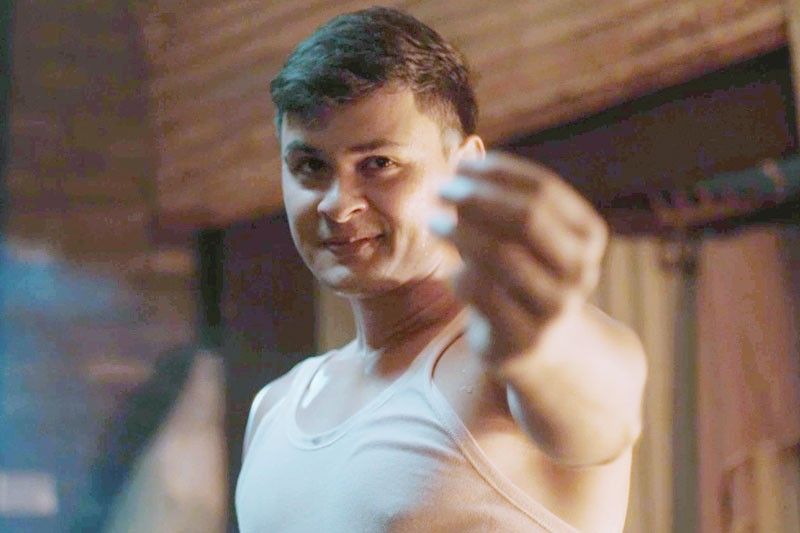Penduko: An entertaining, engaging piece of cinema

MANILA, Philippines — Penduko, starring Matteo Guidicelli and helmed by Jason Paul Laxamana, is an entertaining and engaging fantasy-action-and-adventure piece of cinema. It is also easy to navigate.
The first two scenes of what one may call narrative exposition give one a hint about the conflict that a rural community and the lead character will confront. That involves the use of sorcery or magic.
The leader of a society, Gaston (played by Mark Anthony Fernandez), in Calamundin Village becomes a victim of it, while Pedro Penduko (Matteo) uses his special gift to make quick money in the beto-beto (betting or drop-the-ball-and-color) game common in a town fair.
Taking a cut from fellow players’ winnings somehow speaks of Penduko’s struggle as a waiter who lives independently in the city, yes, away from the countryside, where his father, Apo Tisot (John Arcilla), is a philanthropic healer.

Penduko’s ability to see spirits and elementals like elves makes him eligible to work for the company named “Hatinggabi,” or “Midnight” in English, with the mission to heal victims of sorcery. A female recruiter named Wendy (portrayed by Phoebe Walker) witnesses Penduko’s special gift.

What makes it relatable and contemporary is envisioning the underground company as a call center that uses communication technologies to serve its niche market and provide supernatural solutions. With that, the traditional healing or medicine has become elevated and sophisticated.
The workers are called agents of midnight. However, they need to go through and pass a series of trainings or studies under the tutelage of expert teachers, one of whom is played by Candy Pangilinan.

The wanna-be agents further enhance and discover their talents. This part treats viewers to a quick study about elves (from good to bad, playful to collectors, who help, but in exchange for something), spirit guides, amulets as protections, their efficacy, the use of plants, water, and oil as solutions, sorcerers (manggagaway) and healers (mananambal), and “the” intention that differentiates the former from the latter.
Penduko has to learn that his mission is to heal the victim and not to win a fight. Caring for the sick is a healer’s greatest weapon.
The film also presents an interesting information about how a healer performs his calling. He enters a realm and comes face-to-face with the sorcerer for a duel. It emphasizes the distinction between the strength needed in the physical world and the one required in the supernatural world.
Penduko also highlights the use of Pinoy martial arts and hand-to-hand combat. Some characters are seen using tools like spears in the action-packed sequences.
The sound and visual effects blend well with the unfolding narrative and enhance the cinematic experience.
After acquiring the necessary skills and knowledge, the aspirants that include Penduko and Liway (Kylie Verzosa) have become agents. They will also work with bookers, recruiters, and researchers of “Hatinggabi.” Penduko will eventually meet its head, Gat Blanco (Albert Martinez), who supervises them and views that the agents’ supernatural abilities can be monetized.
This is an interesting “disruption” and twist to the story, which challenges Penduko to make sense of his role in this world: Is he a sorcerer or a healer? The former inflicts harm or pain to another person, while the latter heals or frees the victim from such a plight. If someone with this supernatural ability takes someone’s life, he or she will face a curse for the rest of his or her life.
Penduko is not a caricature kind of main character. He has his own flaws. Penduko also deals with the feeling of revenge as well as the behavior and the consequences that it entails.
Penduko, the character is unique and humanized in that sense.
Aside from presenting and exploring the traditional form of healing, themes about family, particularly the father-and-son relationship, filial and romantic love, forgiveness, and socio-cultural continuity, are tackled at varying levels.
As Penduko is trying his luck in the city, his dad adopts Serafin (played by Migo Valid), abandoned by his parents, to carry on the practice of healing.
At certain points, the audience may also consider the concept of power, as shown in the establishment of “Hatinggabi” and the “Takipsilim” company, or “Nightfall” in English,” with the intention “to punish and take down the evil doers in society,” as the film tells. Part of it is knowing how it can change someone, especially when self-interest and the welfare of many come into play.
Having said that, I think there’s an implied idea about the use of a parochial or global perspective concerning the preservation or exploitation of a traditional talent.
As for the ending, for me, Penduko has an inkling of who and what he is. After all, he has made a decision that will change the course of his life. He will definitely embark on a new beginning, maybe with Liway and the elves, and expand his horizons beyond the woods of the village.
(Rated G, Penduko is this year’s Metro Manila Film Festival entry and is showing in cinemas nationwide.)
- Latest
- Trending

















 Exclusive
Exclusive












